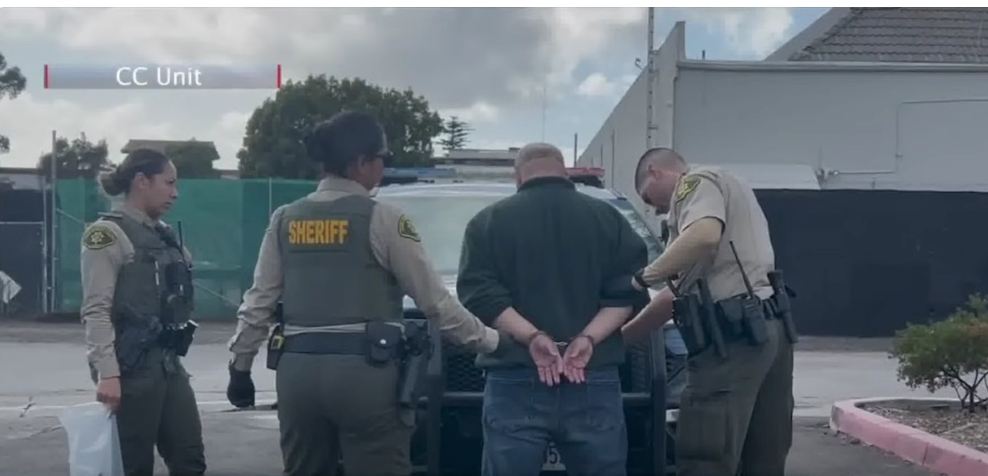Image: Screenshot from CC Unit; via Citizen Takedown.
It often begins with a message no parent wants to imagine. A man logs onto a chat app and sends a note to someone he believes is a 14-year-old girl: “You’re cute. Do you want to meet up later?”
But the girl isn’t real. She is a decoy created by a group known as Creep Catching Unit, or CC Unit for short. Hours later, when the man shows up at the agreed location, he isn’t greeted by a teenager. Instead, he is confronted on camera by an independent “pedo hunter” demanding to know why he was trying to meet a minor.
What Is CC Unit?
CC Unit is a U.S.-based vigilante group that sets online traps for suspected child predators. Volunteers pose as underage teenagers on social media and dating apps. They do not begin the conversations themselves; they wait for adults to make the first move. Once the adult acknowledges the supposed child’s age and continues to pursue the chat, CC Unit arranges a meeting. The confrontations are filmed and later uploaded to YouTube and other platforms, usually accompanied by chat transcripts. Supporters see this as a way of exposing predators and forcing law enforcement to act.
Arrests and Exposures
Since its founding in 2018, the San Diego CC Unit claims to have exposed well over 100 alleged predators, including an elementary school teacher approximately five months ago (links to YouTube video). Some of those confrontations have led to arrests, though the numbers are far fewer than the exposures publicized online. Critics point out that while the videos generate attention and outrage, not every case results in a prosecution, and many suspects walk away without facing formal charges.
The relationship between CC Unit and law enforcement is a double-edged sword. Some law enforcement agencies work in cooperation with CC Unit. However, some law enforcement authorities warn that evidence gathered by civilians may be inadmissible in court. Investigators stress that properly conducted stings require training and controlled procedures to ensure cases can be prosecuted successfully. While some officers quietly accept information passed along by CC Unit, official agencies tend to distance themselves publicly, citing concerns about due process and safety.
The Controversies
The tactics used by CC Unit raise a series of legal and ethical dilemmas. Questions of entrapment, though not legally applicable to civilians, still hover over the operations. The quality of evidence is another issue, since amateur video and screenshots are easily challenged in court. In addition, safety is a concern. Confrontations in public places can escalate, putting bystanders at risk. Some stings have ended in tragedy, with suspects attempting suicide after being exposed online. Civil liberties advocates argue that by bypassing the judicial process, CC Unit risks turning justice into spectacle rather than accountability.
Who Is Behind It?
The most visible CC Unit in the United States is based in Southern California and is led by a man who calls himself “Ghost.” His true identity remains concealed. Since 2018, Ghost has filmed dozens of stings and posted edited clips online, often confronting suspects in San Diego County.
(Editor’s note: The writer of this article lives in San Diego County, within minutes from several of the areas where “Ghost,” the San Diego character behind CC Unit, has confronted pedophiles.)
Why Suspects Take the Bait
Despite widespread knowledge that police and vigilante stings exist, alleged predators continue to fall into the trap. Many seem to believe that online interactions provide anonymity and that they will never be caught. Others rationalize that a decoy is a real teenager and see an opportunity they are unwilling to resist. Some admit to knowing the risks but proceed anyway, driven by compulsions they cannot or will not control. The persistence of these behaviors is why groups like CC Unit continue to attract large online audiences.
Where Things Stand Today
The future of CC Unit is in flux after federal agents executed a court-authorized search warrant at the Carlsbad home of its leader on July 15, 2025; the man behind the “Ghost” persona has been identified as 27-year-old Zaid Gitesatani, and he—along with others in the residence—was briefly detained while agents conducted the search, then released; a federal court clerk confirmed no charges were on file as of July 16, and officials have not stated a motive for the warrant; CC Unit originated in San Diego in 2018 and has staged confrontations across San Diego County (including Encinitas, Oceanside, Vista, Escondido and Carlsbad) and beyond, with documented operations in Los Angeles and San Bernardino counties (e.g., Azusa, Glendale, Santa Monica and Mentone), and in Santa Barbara County a March 17, 2025 sting in Goleta preceded an arrest that resulted in a felony guilty plea. While CC Unit is San Diego-based, ostensibly, its reach extends into other parts of California.
Law Enforcement’s Perspective
The general attitude of law enforcement toward CC Unit is caution, if not outright disapproval. Police departments point to the risks: compromised evidence, safety concerns, and the potential undermining of official investigations. While some officers may privately acknowledge tips from CC Unit, agencies as a whole prefer to keep vigilantism at arm’s length. For prosecutors, the bigger concern is whether cases built on amateur stings can withstand scrutiny in a courtroom.
CC Unit represents a collision between community outrage and the slow, deliberate machinery of law enforcement. This form of catfishing appeals to those who want immediate exposure of predators, but it also raises serious questions about civil liberties, safety, and due process. Protecting children remains a paramount concern, yet justice must be pursued in ways that preserve the integrity of the legal system.
What Parents Can Do If a Minor Is Targeted—or Harmed—by a Sexual Predator
If your child has been approached online or in person by a potential or convicted sexual predator—or, God forbid, has recently been abused—prioritize safety and evidence. Preserve messages, screenshots, call logs, and app metadata; don’t delete accounts or chats; and if there may be physical evidence, place clothing or bedding in clean paper bags (not plastic). Contact your local police department or sheriff’s office so the case can be routed to detectives and the District Attorney, and seek prompt medical care and a forensic exam at a child advocacy center when appropriate. You can also ask a court for a protective order to restrict contact and help keep your child safe.
Even when no school, church, employer, or other institution is involved, civil options may still exist alongside the criminal case. Families can bring claims against an individual offender for torts such as assault and battery and intentional infliction of emotional distress; criminal courts may order restitution, and many states operate crime-victim compensation programs that can help with therapy and related expenses. Realistically, recovery in a non-institutional case depends on the offender’s assets and any available insurance. An experienced attorney can evaluate whether anyone else bears legal responsibility—for example, a negligent property owner, event host, or supervisor—and can advise on statutes of limitation, which are often extended for child victims.
Typically, SurvivorsRights.com focuses on institutional sexual abuse matters (for example, abuse connected to schools and universities, youth sports and camps, religious organizations, scouting and youth clubs, healthcare settings, and residential programs), because institutions have legal duties, insurance coverage, and the ability to enact systemic change. We chose to highlight the CC Unit story because it reflects urgent realities families face outside institutional settings: online grooming and in-person luring can unfold quickly, evidence can disappear, and parents need clear, practical steps, both through law enforcement and through civil avenues that may help pay for therapy and other care.
References:
- NBC San Diego, San Diego Creep Catcher Unit Takes Up Fight Against Online Predators.
- Los Angeles Times, YouTube Channels Hunt Child Predators.
- 10News San Diego, Photographer Arrested After Sting by San Diego–Based Vigilante Group.
- Fullerton Observer, Concerned Citizens Performed a Sting Operation on an Alleged Pedophile That Led to an Arrest.
- CSUSM Chronicle, Measuring CC Unit’s Actions: To Judge or Not to Judge.




